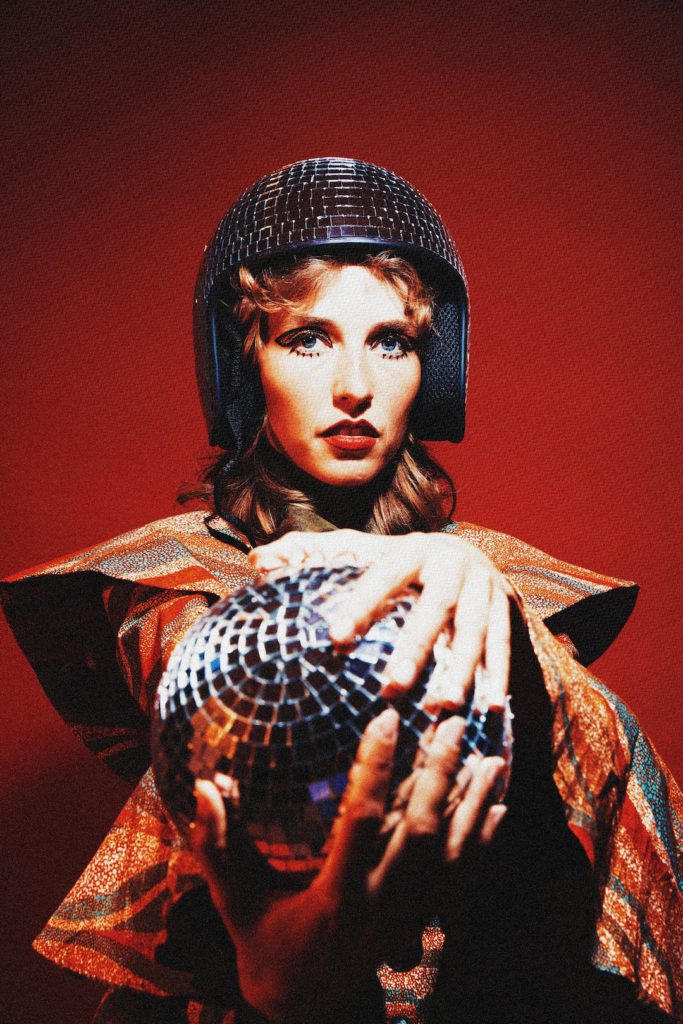
It’s early, at least by club standards, on a Thursday night in mid-May, but the dance floor at El Cid is poppin’. On stage, Ora the Molecule flits between the synthesizer that sits on a table cloaked in glittery fabric and a theremin off to the side of her. When she looks down at the synthesizer, beams of light shoot from her disco ball helmet towards the crowd. Dressed in a red jumpsuit with matching gloves and boots, Ora the Molecule looks like a space disco diva who has just arrived on Earth. Few, if any, people in the crowd can resist her intergalactic groove.
When Nora Schjelderup, the singer and producer behind Ora the Molecule, and I connect for a video call a couple weeks later, I tell her that the show reminded me of sci-fi disco performances from 1970s European variety shows that I’ve seen floating around online.
“Yes!” she responds through laughter. “That’s exactly what I’m aiming for.”
But, Schjelderup’s video inspiration is intended to bring people together in real life spaces.
“It’s so digital, the world right now, and everybody is so isolated in their own little bubble and we look at inspiration mostly on YouTube,” she continues. “We romanticize about the past and I would really love to get the live music aspect back and just meet people to connect on the dance floor.”
Schjelderup is back at her home outside of Oslo when we speak. It’s Monday evening in Norway, but still hours away from sunset. Her tour ended in Romania the previous weekend and Schjelderup is still processing the whole experience. “It’s been so amazing and so intense, but I loved it,” she says.
Dance Therapy, released via Mute back in March, is Schjelderup’s second album as Ora the Molecule, but the first that she views as fully realized. On the album, Schjelderup’s stage persona is a bonafide character, leading listeners through a story of exploration and understanding. “I think Ora the Molecule is now the name and the manifestation of a musical source that I believe everybody maybe has, or some may have more than others,” says Schjelderup.
Ora’s voice is one that Schjelderup created for herself and developed into “a very strict, intergalactic superwoman” who isn’t familiar with societal conventions. The songs, beginning with “Intergalactic Dance,” came before the album’s narrative. “I think that song is what I feel most represents this character,” she says.
With its refrain, “Freak out/ intergalactic dance/ This might be your only chance,” the song also embodies the living-in-the-moment themes of 1970s disco. Production-wise too, Schjelderup plays with tropes of the genre throughout the album, like space-inspired effects and strings, while updating the sound for the 2020s. It’s an album that solidly falls into the nu-disco category, but, what makes Ora the Molecule stand out is that she’s also bringing back the glitter, pageantry and humor of the era in her videos and live performances.
“I really want the ‘70s back in terms of music. I miss this type of diva and extravaganza ,these types of worlds that are so magical and creative and colorful and playful,” she says. “I say it all the time, I feel like I’m born in the wrong time because most of the music that’s played on the radio doesn’t hit my heart very much now. I know that a lot of the music that was played in the ‘70s does hit my heart.”
Schjelderup, who is also a DJ, says that if no one else was going to bring back the ’70s-style spectacle, she would. “I will be a disco diva then,” she says. “Somebody has to do it.”
The Ora the Molecule aesthetic came together organically and out of necessity. A disco ball helmet initially provided a solution for playing in clubs that don’t have actual disco balls. The costume was inspired in part by a performance from Nadia Cassini, the late performer known for her work in Italian films, including the 1978 cult classic Starcrash. “There’s a Nadia Cassini theatrical performance in Italy where… I think she’s being a fish or an underwater creature, but it’s also very spacey and she’s dancing with aliens,” says Schjelderup. “I saw that and I thought I want a bodysuit like that.” The Ora suit was made by Schjelderup’s friend, Ghana-based fashion designer Stella Amoah, and the shoulder pads came via a television appearance on NRK.

At El Cid, Schjelderup’s big disco diva moment came during “Nobody Cares.” She laid dramatically on the stage and sang, “They only love you when you’re dead/They only care when you’re dead/They only see you when you’re dead,” before bouncing up and catching the song’s groove.
Schjelderup wrote “Nobody Cares,” one of the album’s standout songs, after a funeral. “I always wish that the person that died was there because suddenly, everybody loves them so, so much and they’re given everything,” she says. “There’s a part of me that’s very sad about that because I wish that we would speak nicely about each other while we are alive and celebrate each other as much as we can while we are alive.”
While the song is partially a criticism of that tendency to take people for granted when they’re alive, it’s also a call to action to stop worrying about what others think. “We restrict ourselves because we think people care about how we are perceived,” she says. “They’ll only care when you’re dead, so just have fun while you’re here and dare to be you.”
“Nobody Cares” gets to the core of Ora the Molecule’s message. “We are in a highly, highly self-centered culture and the mirror is in our face all the time. We are just hyperaware beings of our existence and how we are perceived,” Schjelderup says. “I don’t think ever in human history we’ve been so presented with the image of ourselves all the fucking time, so I understand. We’ve had social norms throughout all of history, but it’s just so intensified right now and I just really wish that, especially at parties, people would just let that guard off a bit and kind of be like molecules for a moment.”
As Schjelderup brought the show at El Cid to a close with “Løveskatt,” she jumped onto the dance floor to lead a conga line through the audience. In the final moments of the songs, she emerged from a huddle of a fans and danced back onto the stage pumping her gloved, helmet-clasping hand into the air triumphantly,
The goal, Schjelderup says during our interview, is to get people dancing together, which is exactly what happened at El Cid. That’s Ora the Molecule’s journey, she explains, one where the character is shocked by how separated people are when, in fact, we are ultimately one. “We’re on the same team,” she says, before clarifying, “There’s no team. There’s just the team of life that is here, which is just love everything that is alive and care for it.”
Get Dance Therapy by Ora the Molecule.
Catch Ora the Molecule on tour with Cut Copy this fall.
Liz O. is an L.A.-based writer and DJ. Read her recently published work and check out her upcoming gigs or listen to the latest Beatique Mix. Follow on Instagram or Bluesky for more updates. Subscribe to the weekly Beatique newsletter.
Keep Reading:
Swedish Duo Sally Shapiro Returns with New Album Ready to Live a Lie
“Me and My Music”: The Candi Staton Song That Reminds Me Why I DJ